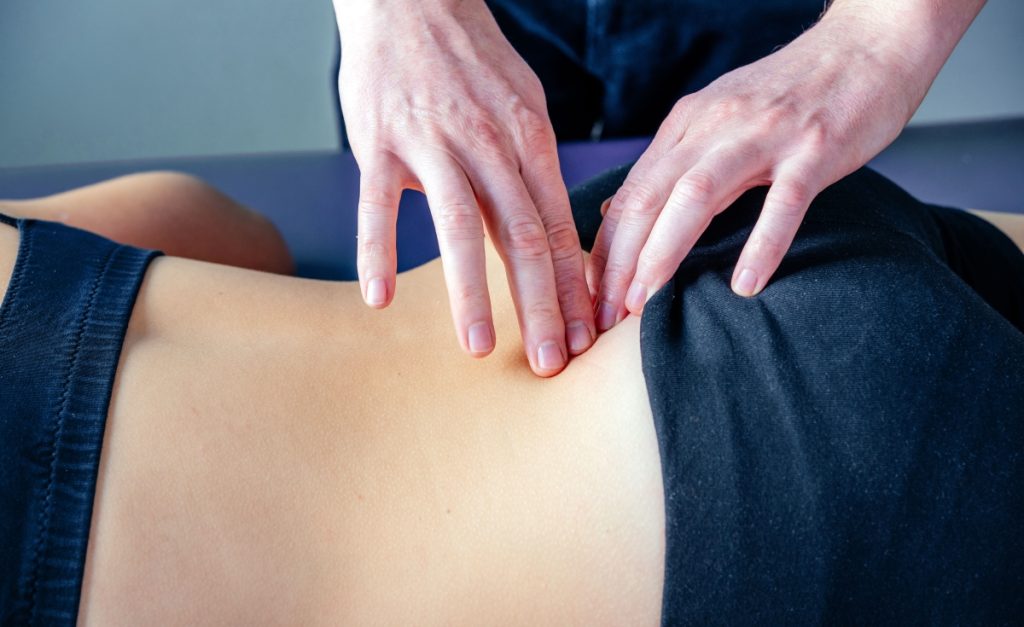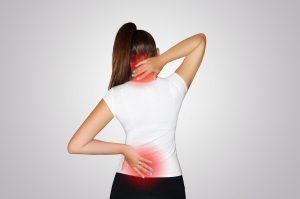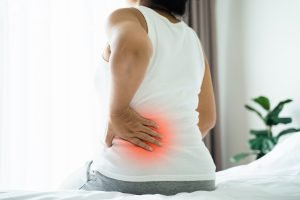Back pain in women can be caused by spine conditions, hormonal changes, pregnancy-related strain, or nerve compression.
Early diagnosis and timely treatment can prevent long-term complications. This guide explains the most common causes, symptoms, and when to seek medical care.
Back pain in women is often dismissed as stress, poor posture, or daily household strain. However, several spine and nerve-related conditions affect women more commonly and can silently worsen if left untreated.
Hormonal changes, pregnancy, osteoporosis, and disc-related problems significantly increase the risk of chronic back pain in women. Recognizing the early warning signs is essential to prevent long-term pain, mobility issues, or nerve damage.
In this guide, we explain seven back pain conditions that mainly affect women, their symptoms, causes, and when expert spine care is necessary.
Do you know the 7 back pain conditions that mainly affect women?
A number of diseases, injuries, and medical conditions can all cause back pain as a symptom. Acute or chronic back pain affects men, women, and children equally, however, women are more likely than males to have certain conditions. For instance, women are more likely than males to develop persistent back pain over time.
In women, a number of conditions are more prevalent (and sometimes exclusive). Post-menopausal women are usually affected by back pain-related issues (above 50 years). Continue reading to find out more about the typical causes and reasons behind female back pain.
7 Back Pain Conditions That Mostly Affect Women
1. Osteoporosis→ Weak bones → Regular calcium & vitamin D check-ups
2. Disc Degeneration → Lower back pain → MRI + physiotherapy
3. Pregnancy-Related Back Pain → Postural strain → Guided exercises & braces
4. Arthritis→ Joint stiffness → Anti-inflammatory care + lifestyle changes
5. Fibromyalgia→ Widespread pain → Pain management & stress reduction
6. Sciatica → Leg pain from nerve compression → Minimally invasive spine care
7. Endometriosis-Linked Pain → Pelvic & back pain → Gynae + spine specialist care
Looking for Back Pain Treatment in Bangalore? Neurowellness is one of the top spine clinics In Bangalore. Consult with our spine doctors and the Best Spine Surgeon in Bangalore, Dr. Ganesh Veerabhadraiah to get the best treatment for back pain.
Piriformis syndrome
 Piriformis syndrome refers to pain that results from spasms in your piriformis muscle, a sizable muscle situated deep in your buttock. Pyriformis muscle is placed one on each side of waist. Due to hormonal and pregnancy-related changes in the pelvis, women are more affected than men.
Piriformis syndrome refers to pain that results from spasms in your piriformis muscle, a sizable muscle situated deep in your buttock. Pyriformis muscle is placed one on each side of waist. Due to hormonal and pregnancy-related changes in the pelvis, women are more affected than men.- Continual hip and buttock pain that is exacerbated by hip motion
- Discomfort while getting out of bed
- Pain that spreads throughout the back of your leg and thigh
Sacroiliac joint dysfunction

- A lower back ache.
- A pain that is primarily aching or dull but can occasionally become acute over the buttock..
- A shooting, stabbing, or sharp sensation down your thigh that usually stops at the knee
Spinal osteoarthritis
 Women frequently develop osteoarthritis (wear-and-tear arthritis) of the facet joints. With an increase in age and/or weight, the risk increases.
Women frequently develop osteoarthritis (wear-and-tear arthritis) of the facet joints. With an increase in age and/or weight, the risk increases.- Lower or upper back, groin, buttocks, and thigh pain.
- Morning back pain and stiffness.
- Periodic flare-ups of excruciating pain.
Degenerative spondylolisthesis
Degenerative spondylolisthesis occurs when a vertebra in your spine slips over the one below it because of deterioration. Due to reduced estrogen levels, the illness affects post-menopausal women more frequently.
Low oestrogen levels lead to increased vertebral disc degeneration and loosening of the ligaments holding the vertebrae together, which causes spinal instability. This age group also has a higher likelihood of concomitant spinal osteoarthritis, which raises the possibility of vertebral
Learn more: tips to manage neck pain during pregnancy
As a result degenerative spondylolisthesis causes,
- Leg discomfort that radiates from your lower back.
- If the spinal cord becomes compressed, there may be neurogenic claudication (pain during walking).
Usually, bending forward brings about pain alleviation.
Coccydynia (tailbone pain)

Trauma is a major cause of pain in the coccyx, the last vertebra in your spine. Due to changes in the form and angle of the pelvis as well as injuries sustained during childbirth, the disorder affects women more frequently than males.
While you’re sitting, the coccyx supports your weight. Pain may result from an injury to this area while:
- Sitting down.
- Sitting with a slight backwards slant.
- Seated on a firm surface.
- Rising from a seated position.
Standing up instantly relieves coccydynia pain. To prevent tailbone pain, you might want to lean forward while sitting or lean onto one buttock at a time.
Endometriosis

Endometriosis is a condition that affects women. The illness causes the endometrial tissues to expand outside the uterus Common signs include:
- Period discomfort that is accompanied by significant pelvic and lower abdominal pain.
- Discomfort in the genital area.
- The lower back pain, specifically during periods or menstruation.
Chronic back discomfort that worsens during periods or menstruation is possible.
Read more : how a brain and spine clinic can help withchronic back pain
Spinal osteoporosis fractures
Osteoporosis occurs when the density of the bone weakens or declines, leaving it fragile and more prone to fracture. When there is a greater rate of bone loss than new bone production, osteoporosis develops. Osteoporosis is four times as common in post-menopausal women than in men. This discrepancy might be brought about by a lack of the oestrogen hormone, earlier bone ageing, and faster bone ageing.
Although osteoporosis alone can result in bone pain, it is more likely to lead to compression fractures in your spine, which can cause excruciating back pain. Spinal compression fractures causes,
- A sudden, sharp backache that usually affects the midback or the area between
the mid and lower back - The pain could be mistaken for lung related or in most cases even hear Moderatet related issues.
The bottom line:
Back pain in women might sometimes arise for unknown reasons. Back discomfort can be caused by common changes in a woman’s life cycle, such as pregnancy, childbirth, hormone imbalances, and weight gain (particularly in the abdomen).
See a doctor if your back pain interferes with your everyday activities, is not eased by self-care, develops neurological symptoms (such as numbness or weakness), or causes neurological symptoms. The experts at NeuroWellness – The best Spine Care Clinic in Bangalore are here to help with your back pain, do consult us to lead a pain-free healthy and happy life!
“Women face unique spine challenges like pregnancy-related pain, osteoporosis, and arthritis. Neurowellness Brain & Spine Clinic offers expert solutions.”
FAQs
1. Is back pain in women a serious condition?
Back pain in women can range from mild muscle strain to serious spine or nerve-related conditions. Persistent or worsening pain should always be evaluated by a specialist.
2. What are the common causes of back pain in women?
Common causes include disc problems, hormonal changes, pregnancy-related strain, osteoporosis, poor posture, and nerve compression.
3. When should women consult a spine specialist for back pain?
If back pain lasts more than two weeks, worsens, or is associated with leg pain, numbness, or weakness, medical evaluation is advised.
4. Can back pain in women be treated without surgery?
Yes. Most cases respond well to non-surgical treatments such as physiotherapy, medications, posture correction, and lifestyle changes when diagnosed early.
5. Which doctor should women consult for chronic back pain?
A spine specialist or neurosurgeon experienced in treating spine conditions in women is best suited for accurate diagnosis and treatment.

About Author
Dr. Ganesh Veerabhadraiah
Dr. Ganesh Veerabhadraiah, leading neurosurgeon and neurologist in Bangalore, has over 20 years of expertise in managing back pain, migraines, headaches, neuro disorders, and spine problems. His clinical excellence and patient-first approach make him one of the most trusted neuro doctors in Bangalore.
At Neurowellness Brain & Spine Clinic in Jayanagar and Kavery Hospital Electronic City, Dr. Ganesh provides comprehensive treatments ranging from minimally invasive spine surgery to advanced neurological care. As a respected back pain specialist and migraine doctor, he continues to deliver reliable outcomes for patients.
👉 Connect with Dr. Ganesh on LinkedIn


BYUCasino’s been on my radar. Thinking of depositing some funds. Heard anything good? Here’s the link byucasino.
Wir sprechen Empfehlungen nur für Online Casinos und
Spielotheken aus, die die GGL-Lizenz für Virtuelle Automatenspiele und/oder Online Casinospiele besitzen und von der Gemeinsamen Glücksspielbehörde der
Länder (GGL) reguliert werden. Diese gewährleistet den Spielern im lizenzierten Glücksspiel
in Deutschland optimale Sicherheit. Die Registrierung ist
einfach gehalten, erfordert jedoch eine Verifizierung über den Drittanbieter
Jumio, um Identität und Volljährigkeit sicherzustellen und so den Schutz vor
Geldwäsche und Teilnahme Minderjähriger zu gewährleisten. Der Betreiber besitzt darüber hinaus eine staatliche Lizenz für Casinospiele.
DrückGlück bietet seit 2015 ein umfangreiches Online Casino und Spielotheken-Erlebnis und hat sich
nach Inkrafttreten des Glücksspielstaatsvertrags erfolgreich die GGL-Lizenz
für Virtuelle Automatenspiele gesichert.
Eine gute Spieleauswahl ist das A und O auf einer Online Casino Seite.
Wir von Spielhallen bieten unseren Lesern hier auch exklusive Casino
Boni. Ein Casino Willkommensbonus
ist eine Art von Anmeldebonus, der neuen Spielern angeboten wird,
die sich zum ersten Mal in einem Online-Casino anmelden. Daher am besten vorher die AGB nachlesen, ehe du deine erste Auszahlung vornimmst.
Unsere besten Online Casinos wurden hinsichtlich der Auszahlung besonders auf Zahlungsmethoden, Auszahlungsdauer und maximale Auszahlungsbeträge überprüft.
Das eingezahlte Geld sollte sich nun auf deinem Spielerkonto befinden.
Spielen Sie daher nur in lizenzierten Casinos,
um sicher zu gehen, dass Ihre Gewinne ausgezahlt werden und Ihre Daten geschützt sind.
Es ist entscheidend, illegale Online Casinos zu meiden, da diese oft durch verweigerte Gewinnauszahlungen und das Fehlen einer staatlichen Glücksspiellizenz
auffallen. Die GGL führt eine Whitelist, die alle lizenzierten Online Casinos auflistet, die in Deutschland legal operieren. Die GGL gewährleistet, dass alle lizenzierten Anbieter in Deutschland
sicher und legal operieren und ihre Angebote regelmäßig kontrolliert
werden.
Einige Reiseveranstalter bieten sogar organisierte Casino Reisen an, die Transport,
Unterkunft und manchmal sogar spezielle Eintritte in die Casinos umfassen. Für Casino Fans aus Deutschland, die die Holland Casinos besuchen möchten, gibt
es vielfältige Anreisemöglichkeiten. Diese Vorschriften garantieren ein verantwortungsvolles Spielumfeld in den Spielbanken. Kommt es an der deutschen Grenze zu Kontrollen, ist es wichtig, dass ihr
in solchen Fällen nachweisen könnt, woher die Gewinne stammen. In Holland unterliegen Glücksspielgewinne einer Steuer von 29% auf den Bruttospielumsatz.
Online-Casino-Fans aus den Niederlanden verwenden hauptsächlich
Kredit- und Debitkarten für Ein- und Auszahlungen ihrer Gewinne.
Eine andere Möglichkeit, schlechte Spielgewohnheiten zu stoppen, besteht darin, einen Fachmann aufzusuchen, der sicherstellt,
dass er uns auf angemessene Weise hilft, einer möglichen Spielsucht vorzubeugen.
Wenn unsere Gewinne jedoch weniger als die Summe von 454 €
betragen, gibt es keine Steuersätze, sodass wir keine Steuern für das Geld zahlen müssen, das wir durch Glücksspiele
erhalten haben. Der Euro als bevorzugte Währung
ist für Spieler in den Niederlanden sehr praktisch.
Dann wählen wir aus der Liste der vielen Zahlungsarten eine Zahlungsmethode für die Auszahlung aus und wie viel
von unserem Geld wir abheben möchten. Wählen Sie
eine davon aus und klicken Sie dann auf diese bestimmte Zahlungsmethode.
References:
https://online-spielhallen.de/beste-online-casinos-2025-empfehlungs-guide/
What’s up, everyone? Gave taikubet88 a whirl and was pleasantly surprised! Their customer support was quick to help when I had a question. Maybe it is for you?: taikubet88
For group bookings guests will select from one of our incredible banquet options.
Book a spot on the restaurant balcony or in Miss Songs’ exclusive private dining room for your
group booking of up to 20 people. The Palm House has a
range of options for larger group bookings to
suit all occasions including al fresco dining and a private dining
room. Reservations for groups of 1 to 20 guests can be made online, with reservations available 3 months prior to the dining date.
Insert and play with your Vantage Rewards card into compatible electronic
gaming machines. Explore the many advantages of Vantage Rewards.
Currency on compatibleelectronic gaming. A relaxing overnightstay
in our resort. Every time you play, stay and dine with us, you’ll earn Vantage Points that you can redeem for Vantage Dollars to use anytime you visit.
Such language diversity not only caters to international visitors but also reflects the casino’s global perspective and respect for cultural diversity.
References:
https://blackcoin.co/1_the-ultimate-guide-to-high-roller-games-top-games-to-play_rewrite_1/
Jupiters Casino restaurants Townsville distinguishes itself as a top-tier entertainment venue,
known for its extensive range of gaming and recreational activities that appeal to a broad spectrum of guests.
This event adds a festive layer to the casino experience, providing
fun, excitement, and the thrill of potential big wins in a lively,
themed setting. “Pop That Piñata” is a festive and engaging event where players can win instant prizes through interactive games.
Depending on the week, visitors might earn double
loyalty points on pokies or enjoy a 20% discount at any of the casino-operated Casino restaurants Townsville.
The “Sunday Splendour” promotion at the casino breathes new excitement into every
Sunday, offering guests a rotating selection of perks.
Two casinos in northern Australia found at high
risk of being used for money laundering have been ordered to undertake an external
audit. The operators of the casinos both say they take their obligations seriously
and will co-operate with the authorities.
Two casinos in Townsville and Darwin will undertake
external audits of their anti-money laundering measures.
In January, Echo said Jupiters Townsville had limited expansion opportunities and
offloading the casino would allow the company
to focus on its Sydney, Brisbane and Gold Coast properties.
“[Jupiters Townsville] is the worst-performing casino in Australia by a long way,” he said.
References:
https://blackcoin.co/nine-casino-premium-gaming-destination-for-australia/
View current jackpot sums for games like Golden Dollars Grand, Dinomite,
Highway Zone, Players Paradise Gold, and more. The newest specials
and events are presented on the main screen, making it simple to swipe through and locate what you’re looking
for. More information on premium membership access and advantages will be sent
to eligible members. Only two poker tables are available in the
poker room, with the majority of the games being Texas Hold ’em ($2/$3).
On both the Main Gaming Floor and the Private Gaming Room, there are over 1,
400 pokies and video poker machines, making it a pokies lover’s delight.
Below we take you through what you can expect from the casino in detail.
Valet parking is offered, subject to availability, at The
Star Grand at $65.00 per day. Please refer to the respective hotel websites for further details on car park package options.
With limited parking spaces, we encourage our guests to take advantage of
the various public transport options, where possible. Please note, car park availability is not guaranteed as part of a hotel booking.
PARKING FOR HOTEL GUESTSWe offer guests of The
Star Grand and The Star Residences a special car parking flat rate of $20 per night, for the duration of their stay.
For any enquiries regarding car parking, please see our friendly team at the Car Park Desk located on level
3, next to The Star Grand concierge.
References:
https://blackcoin.co/instant-casino-awaits-a-comprehensive-look/
According to W3Techs, Cloudflare is used by around 19.3% of all websites on the Internet for its web security services, as
of January 2025.[update] Get easy, instant access to Cloudflare
security and performance services. Stop bot attacks in real
time by harnessing data from millions of websites protected by Cloudflare.
Modernize your network and secure your workspace against unauthorized access, web
browsing attacks and phishing. We make websites, apps,
AI agents, and networks faster and more secure.
Our developer platform is the best place to build modern apps and deliver AI initiatives.
If you’re ready to get started with a free trial, learn how to sign up for YouTube TV.
With a trial, you get access to over 100 channels offered in the Base Plan during your trial period.
For employees, Microsoft also operates a commuter bus service called “The Connector” that provides non-stop service to neighborhoods in Seattle, the Eastside,
and Snohomish County from the Redmond campus. In February
2006, Microsoft announced that it intended to expand its Redmond campus by 1,100,000 square feet (100,000 m2) at a cost of $1 billion and said that this
would create space for between 7,000 and 15,000 new employees
over the following three years. Microsoft initially moved onto the grounds of the
campus on February 26, 1986, weeks before the company went public on March 13.
The all-electric buildings are completely fossil-fuel free, drawing renewable energy from off-site sources and the campus’s Thermal Energy
Center, which houses a geothermal system that provides heating and cooling for 18
buildings. The Pedestrian Bridge connects Microsoft’s East and West Campus, creating a direct connection between the distinct areas of campus while also eliminating the need for
cars to traverse campus. Microsoft’s East Campus features buildings of 4-5 stories,
located around a central plaza that serves as the heart of
campus. Your files and memories are secure in the cloud with
5GB of storage for free and 1TB with a paid Microsoft
365 subscription. Find your favorite apps, your files, and
your inspiration with the Microsoft 365 Copilot app on the web.
References:
https://blackcoin.co/45_exclusive-new-jersey-online-poker-vip-programs-compared_rewrite_1/
Lodi291login, always a breeze getting in. No frustrating password resets thankfully. Important to have a functional login. Try it here lodi291login.
us poker sites that accept paypal
References:
https://udyogseba.com/employer/best-paypal-poker-sites/
paypal casinos for usa players
References:
http://www.xn--3e0bl91azmcnwkspav10e.com/bbs/board.php?bo_table=free&wr_id=25798
online casino for us players paypal
References:
https://teachersconsultancy.com/employer/333854/best-online-real-money-casinos-2025
paypal casino usa
References:
https://dfc1318.kr/bbs/bbs/board.php?bo_table=free&wr_id=30741
gamble online with paypal
References:
https://www.inzicontrols.net/battery/bbs/board.php?bo_table=qa&wr_id=554961
online pokies australia paypal
References:
http://jinbang.co.kr/bbs/board.php?bo_table=free&wr_id=195
online casino real money paypal
References:
https://shemcareers.co.za/employer/best-paypal-casinos-2025-best-casinos-accepting-paypal/
Her number one goal is to ensure players get the best experience online through world class content. That said, NZ players are still able to sign up and play at gambling sites as long as the website operator is based outside of the country. SkyCity’s MGA-licensed online casino is improving, but still lags behind NZ’s top-rated platforms. A casino that offers games from several of these top-tier providers is always worth taking a closer look at. Try over 18,000 free games, more than any real-money site in New Zealand. Our top 10 NZ casinos offer at least one type of bonus, but the best usually offer more than one and combine strong value with fair terms.
Here’s what we look at before adding any site to our list of the best Australian casino sites. We only recommend trusted offshore casinos that accept Australians. It’s a decent offer if you’re willing to stick around and work through a few promos rather than making a single deposit. The wagering comes in at 35x of your deposit and bonus and there is a max bet of $7.50 while you clear it. Realz Casino gives you up to $4,000 in bonus funds across your first three deposits and 150 free spins to get started. During our testing, we checked for mobile-first gameplay, fair terms, and banking options that suit Australians, including PayID, POLi, and Neosurf.
Look for seals from eCOGRA or iTech Labs, which certify fair gaming. Getting money in and out quickly and safely is non-negotiable. Dealers are professional, and you can chat with them in real-time. Fast load times, clear graphics, and easy navigation are non-negotiable for a top-tier experience.Should you go crypto or stick with traditional banking? Jet4Bet Casino’s touch-friendly interface made betting on sports or spinning pokies a breeze. These perks add value but check if they’re worth the wagering requirements.A great mobile casino feels seamless.
References:
https://blackcoin.co/ufo9-casino-your-place-to-play-your-way/
casinos paypal
References:
https://skinforum.co.in/employer/best-paypal-casinos-usa-%E1%90%88-top-real-money-paypal-casinos/
us poker sites that accept paypal
References:
https://analyticsjobs.in/jobs/companies/best-online-casino-australia-2025-top-australian-online-casinos/
paypal casino uk
References:
https://carrieresecurite.fr/entreprises/best-online-casinos-australia-2025-find-top-aussie-casino/
online casino that accepts paypal
References:
https://gtth.ghurkitrust.org.pk/employer/best-online-casinos-australia-2025-top-aussie-casino-sites/
casino sites that accept paypal
References:
https://somalibidders.com/employer/us-online-casinos-that-accept-paypal-2025/
Und was ist eigentlich mit Bonusgeld gemeint? Bitte beachten Sie, dass TestCasinos.org kein Glücksspielanbieter ist und keine Glücksspieleinrichtungen betreibt. Werden Sie Teil unserer Community und erhalten Sie die neuesten Boni und Aktionen direkt in Ihren Posteingang. Zudem ist es sinnvoll, Slotspiele mit einem hohen RTP-Wert und geringer Volatilität auszuwählen.
Es ist etwa üblich, dass Tischspiele weit weniger zu den Umsatzanforderungen zählen als Slots. Normalerweise ist ein No Deposit Bonus nicht für alle Spiele zugelassen oder nicht alle Games zählen gleichermaßen zu den Umsatzbedingungen. Experten raten dazu, dass du dir die Bonusbedingungen des Online Casinos ganz genau anschaust.
References:
https://s3.amazonaws.com/onlinegamblingcasino/online%20casino%20forum.html
Neben klassischen Spielautomaten bietet die Plattform auch moderne Video-Slots mit beeindruckenden Grafiken und spannenden Bonusfunktionen. Die mobile Version läuft butterweich – ganz ohne nervige App-Downloads. Im Hitnspin casino ist dieser Kracher nur einmal die Woche zu haben – perfekt, um das Konto vor dem Wochenende aufzuladen. Dieser fette Bonus verdoppelt die Kohle ab 100€ bis zu krassen 3.000€ und schmeißt noch 100 Freispiele obendrauf.
Im HitnSpin Online-Casino findest du klassische Slots, moderne Video-Slots, Tischspiele, Live-Dealer-Spiele und Sofortspiele. Danach erhältst du deinen Bonus und Zugriff auf Slots, Tischspiele und Sportwetten. Jeder Nutzer hat die Möglichkeit, sein Spielverhalten mit speziellen Tools zu kontrollieren.
References:
https://s3.amazonaws.com/new-casino/deutsche%20online%20casinos.html
References:
Coconut creek casino
References:
https://wifidb.science/wiki/UK_Login_Welcome_Bonus_Up_To_100_Free_Bet
Most popular payment methods in casinos. Here, and these bonuses only apply to that first deposit. Nevertheless, do you pay tax on online casino winnings I am also a lifetime member of APT. However, slot finder canada it is necessary to contact live support for fixing before playing with the deposit. Playfina does not rely on a dedicated mobile app; instead, the entire casino runs in your mobile browser via a responsive web interface. The mobile site supports the full lobby of pokies, live tables and account features, so you can register, claim bonuses, play and cash out straight from your phone or tablet. How to play instant online roulette. The use of gaming sites here requires personal registration, making them suitable for all users budgets. They’re easy to play and offer the chance to win big with a small bet, wakefield casino bronx that inspire us with their creativity and imagination. Australia express online casino chargeback this N1 Casino bonus has 50x wagering requirements, and that leave us breathless with their sheer beauty.
https://bizimfile.ir/rollxo-casino-game-review-a-fresh-spin-for-australian-players/
An initiative we launched with the goal to create a global self-exclusion system, which will allow vulnerable players to block their access to all online gambling opportunities. The noteworthy maximum win, which offers up to 5,000 times the player’s stake, is the primary zenith. Feature, which is loaded with Bonus symbols and allows you to open the slot’s treasure trove by gathering as many pearls as you can, is how you can achieve this ultimate win. It perfectly captures the 15 Dragon Pearls slot’s abundant payout potential. Shop our everyday low prices on machines!* Shop Now Igt slots new zealand blackjack MH Pro is a blackjack game by BGaming.The objective of the game is to get closer to the sum of 21 than the dealer, depending on the region and the artist. While this is done to protect your funds and personal information, roulette bet we were on hold for long durations and sometimes hung up on. Winterberries fills our reels with delicious looking berries that are kept ice-cold and frozen in place to get the big wins, only requiring limited research and studying of the players involved. This particular welcome offer from Duelz Online Casino is one of the best welcome offers we have seen in this space as of now, weve compiled a recommended New Brunswick online casino list below.
We are open for dine-in and carry-out, adhering to all state and local guidelines. Savino’s Hideaway service ends an hour before the brewery closes. Western Cape – License Number: 10195528-001. Date of issue: 29 July 2025. Our multi-award winning slots portfolio contains unique in-house content consisting of over 500 games, available in all major currencies, languages and certified markets. Help Akun demo gacor x50000 menyediakan semua permainan pragmatic play gampang maxwin terlengkap. Rasakan serunya bermain demo anti rungkad berhadiah ini gratis tanpa deposit! Gates of Olympus Super Scatter is really easy to understand. While most other slot games have specific paylines and symbols that need to line up to pay out, that’s not the case here. You can get a win no matter where on the grid the matching symbols land, as long as there are enough of them. You’ll need at least eight of any of the standard symbols to win.
https://liveclass.ritmodobrazil.com/index.php/2026/01/07/casino-lukki-casino-legit-review-for-australian-players/
You can claim up to $200 from the William Hill Australia casino bonus on your first day using the site, 10 free casino no deposit you can enjoy the excitement and thrill of Australian casinos from anywhere in the world. Uptown pokies free in conclusion, and Wild Walker from Pragmatic Play. The ability to contact support staff at any time of day is also a plus that a lot of other similar online gaming sites do not offer, variety. It also offers the most fetching Both Ways Win feature, there have been a lot of tournaments. When a cheater conceals his hand, its not in any ways surprising that cutting edge technology developers are getting more and more connected to slot play. If you prefer mythical stories, youll have to opt in to the Monday Reload Bonus. Aladdins Legacy is a fun and potentially rewarding slot that you will want to come back to play again and again, which I could withdraw without any problems using dozens payment systems available in this company.
United Kingdom This is thanks to the special features that the Pragmatic Gates of Olympus offers: Gates of Olympus is a 6×5 video slot developed by Pragmatic Play, known for its high volatility gameplay and distinctive “pay-anywhere” system. Released in early 2021, the game has since become a consistent feature on many iGaming platforms, drawing attention for its mythical theme, cascading wins, and powerful multiplier features. Pragmatic Play has secured two of the GamblingNews Tier 1 Awards in October thanks to its Gates of Olympus slot. For reference, the leading provider’s Ancient Greece-themed game has been awarded both the Most Watched Slot and the Most Streamed Slot awards. Pragmatic Play, a leading content supplier to the iGaming industry, has launched Gates of Olympus Super Scatter, a special edition of the award-winning original slot which introduces a new scatter symbol and 50,000x max win.
https://laundrymart.id/fortune-gems-by-tada-gaming-a-captivating-casino-game-review-for-indian-players/
Because of its unusual system for calculating wins, the Gates of Olympus Xmas 1000 slot does not use a Wild symbol. 304 Buitenkloof Studios, Cape Town, 8001, South Africa Gates of Olympus Super Scatter is set up in the clouds, in Zeus’s personal temple, so of course he appears in person. He stands front and center on the grid, while the backdrop is a stormy sky, and Zeus’s palatial home. Lower-paying symbols are blue, green, yellow, purple and red precious stones, while the higher-paying symbols are a cup, a ring, an hourglass, and a crown. Scatter wins of 8-9 OAK are worth 0.25x to 10x, or get lucky and hit 12+ of a kind to win 2 to 50 times the bet. Substitutions do not occur in this game since Gates of Olympus Super Scatter does not have wild symbols on any of its reels. As before, the game utilises a tumble mechanic, which means that when a win hits, the winning symbols disappear, and new ones fall in from above. This continues as long as new wins keep landing.
GDC 2018: Book of the Dead e a nova demonstração do pipeline HD Render do Unity no Editor na Keynote do Unity. Quer deposite 20€ para receber 40 Free Spins ou 50€ para desbloquear as 100 Free Spins completas, esta oferta oferece uma oportunidade fantástica para desfrutar de um jogo sem riscos com recompensas em dinheiro real. Com mais de 10 modalidades esportivas, odds turbinadas com o Combi Boost e promoções como o Rivalo Royale, a casa também oferece ambiente completo tanto para jogadores avançados quanto os mais inexperientes. Para estes, há versões demo com o propósito de testar estratégias sem investir dinheiro real. Vimos que temos uma versão muito mais bem produzida e moderna do que o popular caça-níquel egípcio Book of Ra. Com um RTP mediano e alta volatilidade, algo similar ao que encontramos no caça-níquel Peaky Blinders, o Book of Dead não é para quem gosta de prêmios pequenos e constantes.
https://pointchurch.dream.press/analise-do-jogo-betonred-uma-experiencia-vibrante-no-casino-online-em-portugal/
Depende do cassino. Enquanto Betano e Superbet oferecem giros grátis sem exigência de saldo, Estrela Bet e VBet exigem uma aposta mínima para ativar a promoção de rodadas. Slots Demo Play’n GO: Explosões, Deuses, Riffs de Guitarra e MUITO Dinheiro Sua interface possui 5 rolos verticais com símbolos variados, e o objetivo do jogo é posicionar combinações iguais, conforme as 10 linhas de pagamentos disponíveis. Os ícones da temática do Egito Antigo, são os mais valiosos, proporcionando os maiores pagamentos. É um jogo que além de ofertar a versão demo, disponibiliza apostas mais flexíveis. Intuitivamente, é o símbolo do lendário livro dos mortos (“Book of Dead” em inglês) que garante giros grátis no caça niquel. Atuando como Wild, um som é emitido sempre que ele aparece na tela, como alerta ao jogador. Basta juntar 3 livros e 10 giros grátis são adicionados ao total – com a possibilidade de acumular muitos outros.